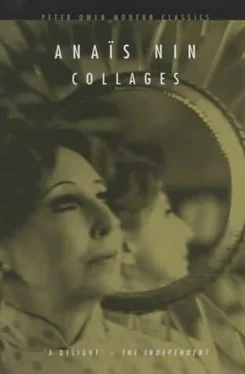NOBUKO WAS SMALL AND DAINTY. She carried her head heavy with the bun of glossy black hair on a delicate neck gently undulating as in classical Japanese prints. The flawless golden skin at the nape of the neck exposed by the open collar of the kimono attracted the eye with a delicate yielding quality and had been justly declared an erotic zone. She had a chanting child-like voice, a laugh like windchimes and a graceful way of standing and sitting creating an aesthetic delight. Her eyes were small, narrow, intensely brilliant; her nose had almost no bone like the nose of a child. She kept a precarious balance between sprite, woman and child. Her face was the face of the moon become woman. Her talk was light and breathless, with a tone of voice ranging from song to dove’s cooing to a schoolgirl’s laughter in forbidden places.
She wore a kimono of white cotton embroidered with eyelets, and over this a black transparent one, the layer of white like the pearly glaze of pottery, a bride seen through a widow’s veil. The obi was red. On the back of her black silk coat appeared a large red chrysanthemum.
“I must apologize, because in Japan my mother owns a kimono for each day of the year as each design must match the season and the flower or plant in bloom that day. I should not be wearing chrysanthemums in February when they only bloom in May. I would like to learn American freedom in clothes, in everything. I would like to be like you, Renate, you are the freest woman I know. I only saw such freedom in Italy where they are so natural, and in Japan everything is unnatural.”
With her two index fingers she held up the corners of her mouth into an exaggerated grin. “We must always smile,” and then dropped her lids and mimicked a flood of tears falling from her eyes, “even when we feel like weeping.”
They were all sitting at the beach, and Renate offered her a drink in a paper cup.
“It is not a very beautiful cup,” said Renate.
“But it seems beautiful to me because it is so simple, it does not require a ceremony, to be polished, and served on the right tray at the right moment. Everything is so simple here. In my country I was considered a very advanced girl. But ever since I have started to travel in order to become an actress I have learned that I am still bound to tradition and conventions. When I went to Paris I was invited for a week-end in the country. The young people had a guest house of their own. It was called La Maison des Oiseaux. (When Nobuko said “ oiseaux “it sounded like the sibilance of bees, of breeze.) I was so formal and proper. They were sweet about my fears. I came to America to learn to be free. Ancient beliefs are still so strong in Japan, tradition is imposed on us by our parents, but the new Japan pulls us away, the young are caught in this conflict. We cannot emancipate ourselves if we stay there, we must get away. I love my family and I do not like to offend them. I do not feel free.”
Renate had just visited cherry blossom trees grown by Japanese gardeners. Nobuko laughed at Renate’s admiration of the cherry blossoms. “They are so silly, they bloom so briefly, and the rest of the time they drop worms on our hairdos.”
When Nobuko spoke of intimate things like the Maison des Oiseaux , she bowed her head and closed her eyes as if she were in a confessional. She locked her small hands as if to pray for this new Nobuko trying to be born.
Nobuko was given the role of Cassandra in Trojan Women of Euripides. She struggled to emerge from her Japanese print movements. She rolled over rocks, fell on her knees, shook her long black hair and collapsed in disordered grief. It was a caricature of a Western interpretation of Greek tragedy. One feared to see her snap her fragile neck, or force the exquisite lines out of shape forever.
After the play, receiving visitors and compliments, she held her small hand before her mouth as if to screen the new bold words she might utter, as if to muffle their effect .
All through rehearsals she avoided using the word “rape.”
She talked about the Sabine women being deflowered. “The characterization of Cassandra,” she said, “is still a conflict between the director and the chorus.” But for Nobuko it seemed more like a conflict between a Western interpretation of Greek tragedy as chaos and a classical Japanese elegance of style.
“Renate, please don’t bother yourself to go beyond what you can do for my acting career, only what comes neatly in your way.”
The second visit she made Renate, she wore a yellow silk kimono and carried a small basket. With her black hair high on her head, she looked like a giant sunflower with a black velvet core swaying in the fields.
She opened the smallest pill box in the world to take out a sucaril tablet.
“I was given a film test today. It was for a Western, and they shoot so promiscuously.”
Another time she wore a dove grey kimono with an orange obi, and she let her head incline to one side as the tulips do at night.
“Renate, I’m at a loss what to do with my tremendously long and unknown future. I’m really not so sure I’ll be able to accomplish what I’ve dreamed of, what I’m searching for.”
It was now the month of May. Nobuko wore a kimono embroidered with a purple jacaranda bloom, with a gold obi. At last she felt in harmony with nature’s designs.
“All I want, Renate, is not to be a good-for-nothing.”
Renate painted a portrait of her. While Renate worked Nobuko watched her freedom of movements, freedom of dress, her quick responses and inventive language.
And then it was time to leave.
From New York she wrote on purple tissue paper because the sun was absent. She sent Renate photographs. “Two are loud and embarrassing for commercials, but the small one is in a funny way old-fashioned and natural, so this is for my dear person Renate. I have understood very well what you have explained about independence. It is obvious that life and career in Japan must be much easier and less strenuous, but I consider myself so fortunate to be able to taste the bitter sweet of freedom. Vaulting ambition in theatrical experiment and the obsession not to be a good-for-nothing in addition to impatience and restlessness cause me a lot of worry.”
Another letter came in orange tissue paper because the sun was out: “My plant, just a simple rubber plant, is growing energetically, and it does tell me spring is here. I know this is the end of my very dear and most thrilling season of life. Imean to leave America and plunge into the Japanese theatre world, and this is a very strangely complex feeling. Youth, Passion, Dreams and a long long future… They are quite frightening to me. Such a great responsibility. If I were to end up as a good-for-nothing. Renate, the other night I was awe-stricken, truthfully, when I realized that if you love someone else dearly, for example my parents, my sister… You can’t even have the last freedom that you possess, the free choice of death…”
Renate could see Nobuko bound in her enveloping kimono, the wide sleeves like closed wings against her body, the feet in white cotton and sandals, seeking to shake off the ritualistic past, the thoughtful meditative forms, the contained stylizations, and she wondered whether she could emerge from centuries of confinement.
Nobuko wrote: “I could not write you yesterday because it was raining and I did not find any pearl grey paper to match.”
THE FRENCH CONSULATE WAS HOUSED in a pseudo-Spanish house at the topof the Hollywood Hills. It conformed in no way to the Hollywood expectations about a French Consulate. The French Consul was a novelist, his wife wrote biographies, the secretary who opened the door did not look like Brigitte Bardot, the desk at the entrance was plain, the rooms were not furnished in Louis XVI style, nor in the fourteenth-century style, nor Empire.
Читать дальше












